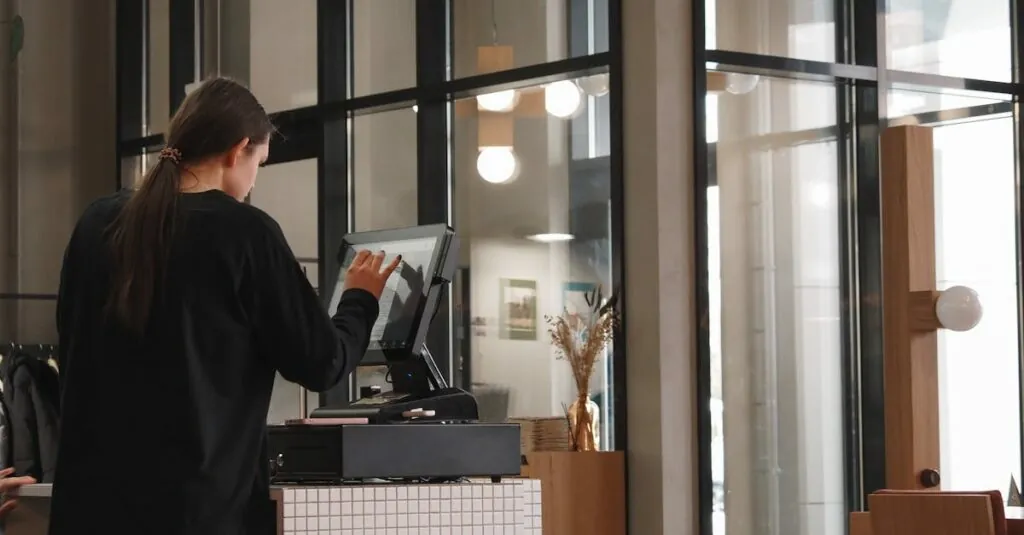Table of Contents
ToggleIn a world where shopping has transformed from leisurely strolls through malls to a high-tech treasure hunt, retail tech is the secret sauce that keeps the industry sizzling. With innovations popping up faster than a kid on a sugar rush, staying ahead of the curve is crucial for retailers looking to thrive. From AI-driven inventory systems to virtual fitting rooms that make trying on clothes as easy as swiping right, the future of retail is not just bright; it’s practically glowing.
But don’t let the shiny gadgets fool you—understanding the latest retail tech insights can feel like deciphering a toddler’s drawing. Fear not! This article will break down the essentials, making tech trends as digestible as your favorite snack. Get ready to dive into the world of retail technology where every click and swipe could lead to the next big breakthrough.
Overview of Retail Tech Insights
Retail technology evolves rapidly and drives competitiveness. Innovations like AI-powered inventory systems play a crucial role in optimizing stock management. Virtual fitting rooms provide customers with unique experiences by allowing them to try on clothes virtually. Data analytics transforms how retailers understand consumer behavior and preferences. Cloud solutions enhance collaboration and scalability for businesses of all sizes.
New shopping experiences emerge from augmented reality, enabling customers to visualize products in their environments. Payment technologies simplify transactions through mobile wallets and contactless methods. Supply chain optimization relies on advanced tech to increase efficiency and reduce costs. Personalized marketing campaigns leverage customer data to create targeted promotions.
User experience continues to be a focus area, with chatbots addressing customer inquiries in real-time. Omnichannel strategies integrate online and offline shopping for seamless customer journeys. Sustainability initiatives benefit from technology, allowing retailers to track their environmental impacts more effectively. The use of machine learning algorithms predicts trends, helping retailers adapt quickly to market changes.
Overall, retail tech insights highlight significant advancements that not only benefit businesses but also enhance customer satisfaction. The integration of these technologies reshapes the shopping experience, making it more efficient and enjoyable for consumers.
Key Innovations in Retail Technology
Retail technology continues to evolve, integrating innovative solutions that boost efficiency and enhance customer experiences. Key innovations include artificial intelligence and augmented reality, which reshape retail strategies.
Artificial Intelligence in Retail
Artificial intelligence plays a critical role in optimizing operations across the retail sector. Inventory management systems leverage AI to analyze stock levels and predict demand, reducing waste. Personalized marketing campaigns utilize AI to analyze customer data, creating tailored recommendations and driving higher conversion rates. Customer service chatbots provide instant support, improving responsiveness and customer satisfaction. Moreover, machine learning algorithms analyze purchasing patterns, allowing retailers to adjust strategies in real time based on market trends.
Augmented Reality and Virtual Reality
Augmented reality and virtual reality revolutionize the shopping experience by providing immersive interactions. Virtual fitting rooms allow customers to visualize products on themselves without physical trials. Enhanced product visualization through augmented reality helps customers make informed purchasing decisions and reduces return rates. Retailers can create unique experiences by integrating AR features into their mobile apps, engaging consumers at a higher level. VR showcases products in fully interactive environments, enhancing brand storytelling and customer engagement. By incorporating these technologies, retailers can create memorable shopping journeys that strengthen customer loyalty.
Impact of Retail Tech on Consumer Experience
Retail technology significantly transforms how consumers interact with brands, enhancing their overall shopping experience. Through innovative solutions, retailers can now meet consumer expectations while fostering loyalty.
Enhancing Customer Engagement
Advanced technologies engage customers at deeper levels. Chatbots provide instant assistance, answering queries without delay. AR features allow virtual experiences, making product trials immersive and fun. Gamification strategies encourage participation, driving repeat visits to store platforms. With seamless omnichannel approaches, customers experience consistent branding across all touchpoints. Dynamic content keeps interactions fresh, ensuring relevance in real-time.
Personalization and Customization
Personalized experiences become the norm in modern retail. Data analytics gather insights, tailoring offerings to individual preferences. Shopping recommendations are based on previous purchases, creating a unique journey for each customer. Customized marketing campaigns target specific demographics, enhancing engagement rates. Retailers use machine learning to predict trends, ensuring timely and relevant products reach consumers. Individualized promotions strengthen connections, making shoppers feel valued and understood.
Challenges Faced by Retail Tech
Retail technology faces several challenges in its ongoing evolution. Addressing these challenges is crucial for retailers seeking to leverage technological advancements effectively.
Data Security and Privacy Concerns
Data security remains a paramount concern for retail technology. Retailers handle vast amounts of customer data, heightening the risk of breaches. Ensuring robust cybersecurity measures helps protect sensitive information. Consumers increasingly demand transparency about how their data is used. Regulations such as GDPR impose strict compliance requirements, compelling retailers to adapt their practices. Building customer trust through clear privacy policies can enhance brand loyalty. Striking the right balance between personalization and privacy becomes vital in this landscape.
Integration with Existing Systems
Successful technology integration poses challenges for many retailers. Legacy systems often complicate the adoption of modern solutions, leading to operational inefficiencies. Streamlining workflows requires seamless data transfer between platforms. Retailers should prioritize investing in compatible technologies that enhance interoperability. Training employees on new systems also proves essential for a smooth transition. Effective integration provides opportunities for better analytics and improved customer experiences. Adopting a phased approach can ease the transition and minimize disruptions.
Future Trends in Retail Technology
Artificial intelligence continues to lead innovation in retail technology. AI enhances personalized shopping experiences, improving customer relations while optimizing inventory management. Augmented reality offers immersive interactions, enabling virtual fitting rooms and interactive product displays. Retailers utilizing AR can significantly lower return rates by allowing customers to visualize products before purchasing.
Omnichannel strategies are gaining traction, ensuring seamless interactions across various platforms. Customers expecting consistent branding demand that retailers provide integrated experiences, blending online and offline shopping. Machine learning algorithms are crucial for forecasting trends, allowing businesses to adjust their offerings in real time.
Data analytics transforms retail strategies, providing insights into consumer behavior. Understanding preferences enables retailers to tailor their marketing campaigns and improve customer satisfaction. Cloud solutions enhance collaboration, facilitating real-time data sharing among teams and improving operational efficiencies.
Sustainability is becoming increasingly prioritized, with technology supporting eco-friendly initiatives. Retailers monitoring their environmental impacts can appeal to conscious consumers seeking sustainable practices. Payment technology advancements streamline transactions while ensuring security, giving customers peace of mind.
User experience remains a focal point, with chatbots offering instant assistance and enhancing customer service. Engaging customers through gamification strategies encourages participation and strengthens brand loyalty. As retail technology evolves, addressing data security and privacy will be essential. Retailers navigating compliance with regulations like GDPR must prioritize transparent privacy policies to foster customer trust.
Successful integration of new technologies into existing systems also poses challenges. Investing in compatible technologies and providing employee training ensures smooth transitions and enhances overall operational effectiveness. By focusing on these key trends, retailers can adapt to the changing landscape and deliver exceptional shopping experiences.
Retail technology is transforming the industry at a rapid pace. By embracing innovations like AI and augmented reality, retailers can enhance customer experiences while optimizing operations. The focus on personalization and seamless interactions is reshaping how consumers engage with brands.
As retailers navigate the challenges of data security and integration, staying informed about emerging trends is crucial. Investing in the right technologies and training can lead to improved efficiency and stronger customer loyalty.
The future of retail lies in leveraging these advancements to create memorable shopping experiences that resonate with today’s consumers. Adapting to this evolving landscape will be key for retailers aiming to thrive in a competitive market.





